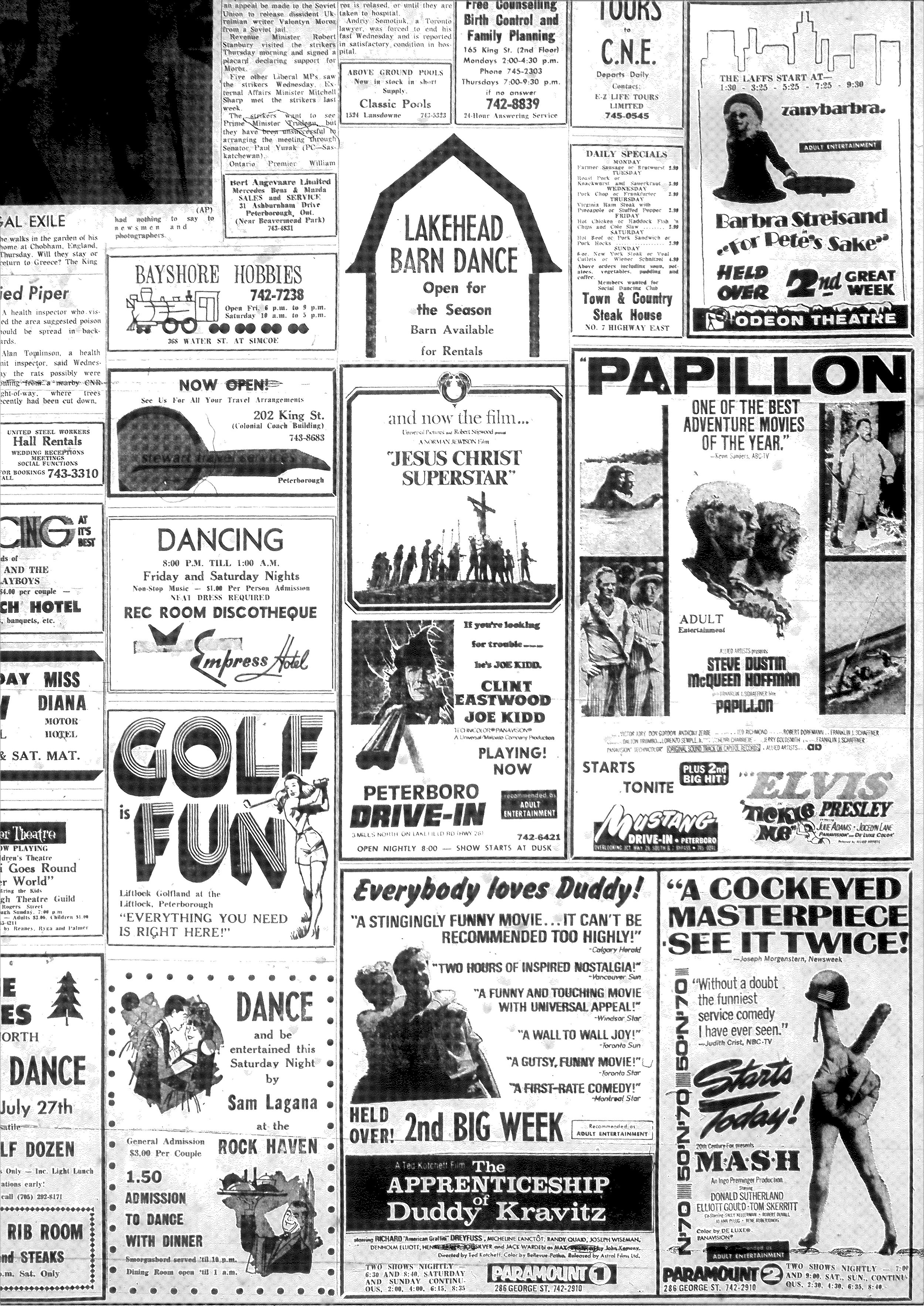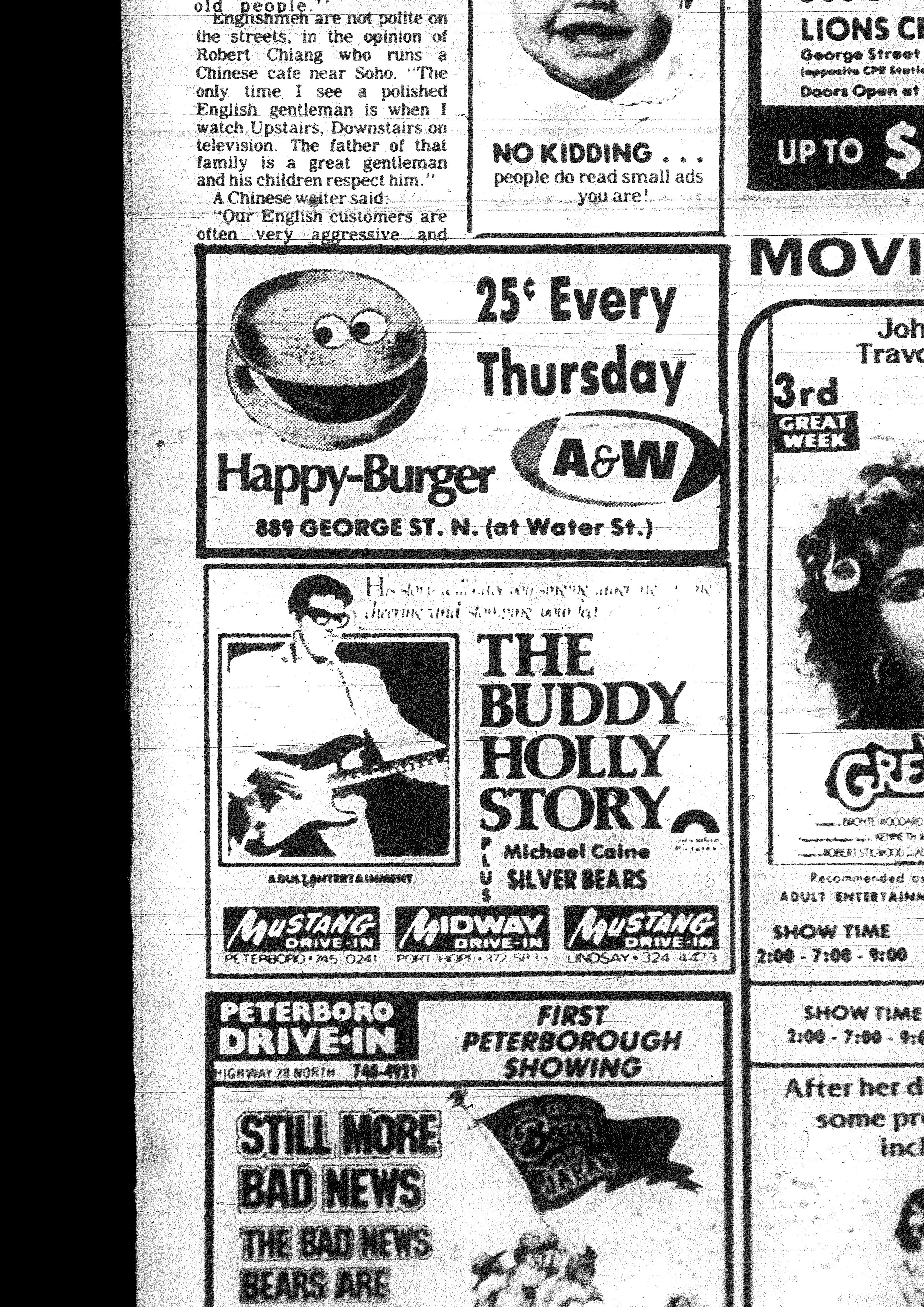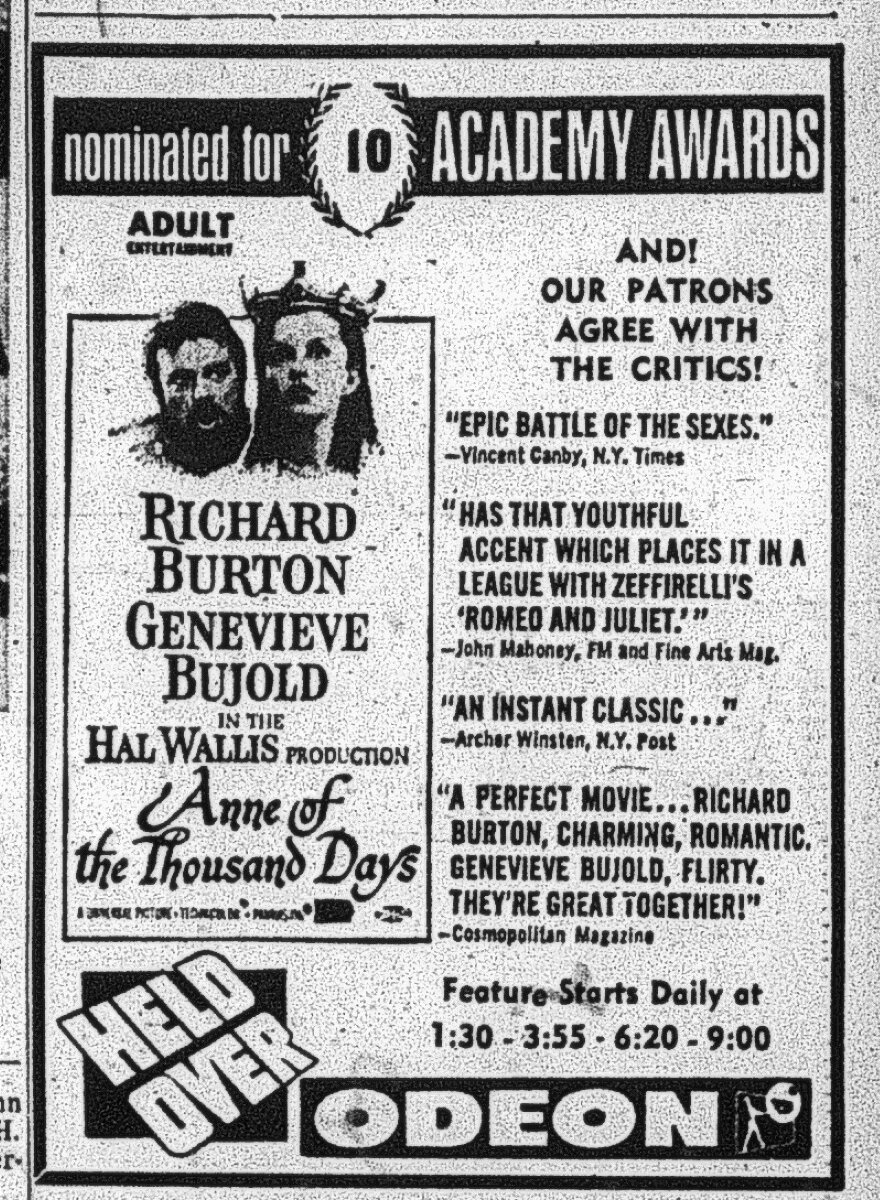From the 1970s to 2000s: The Paramount and Odeon Meet Cineplex and Galaxy
The bright lights remain on a rainy night: no theatre row, but one huge cinema with multi-screens. The Galaxy, 2019, as viewed from Water and Simcoe. Photo by and with courtesy of Pat Trudeau.
“Till the eyes tire, millions of us watch the shadows of shadows and find them substance; watch scenes, situations, actions, exchanges, crises. The slice of life, once a project of naturalist drama, is now a voluntary, habitual, internal rhythm; the flow of action and acting, of representation and performance, raised to a new convention, that of a basic need.” – Raymond Williams, “Drama in a Dramatised Society,” 1974.
*****
In the late 1960s and early 1970s, like other places Peterborough and its two theatres, the Paramount and Odeon, experienced an increased wave of interest generated at least in part by baby boomers, the “New Hollywood,” and a film culture that permeated life in a way that had not been seen since the 1940s. “It was at this specific moment in the 100-year history of cinema,” Susan Sontag wrote, “that going to movies, thinking about movies, talking about movies became a passion among university students and other young people. You fell in love not just with actors but with cinema itself.”
Despite the advent of video and easy access to movies at home in the 1980s, going to the movies was by no means, as often predicted, at a dead end. Writing in the early 1990s, Douglas Gomery looked at the last quarter of the twentieth century and saw a “renewed interest and more change in the movie theatre business than any time since the age of the movie palace.”
More screens needed. Again following a trend in other cities, the Paramount split itself into two screens in 1972. The Odeon followed suit by 1979, building a wall down the middle of its auditorium to create an extra space. Now the city had more but smaller places to see films. The city was now also a little larger, reaching about 65,000 in 1980.
Left: Examiner, July 26, 1974, p.16. Right: Examiner, July 4, 1978, p.18. The Paramount has theatres 1 and 2. At the Paramount in 1974, a rare Canadian film, The Apprenticeship of Duddy Kravitz (1974), and a re-run of M*A*S*H. (1972). Kravitz, says historian George Melnyk, represented “a breakthrough that signalled the coming age of multiculturalism” in Canada. The 1978 drive-in ad connects the Peterborough Mustang and the Port Hope and Lindsay theatres to the same owner, Premier Operating Company. The Peterborough Drive-In closed in 1985; the Mustang held on until September 2012.
True romance at the moving picture show: it must have happened more than once. Kathryn and Raymond Eathome, now living in England, told me they met for the first time at the Odeon Theatre in Peterborough. It was on a blind date set up by Kathryn’s sister — on April 16, 1970 — and in 2020 they were celebrating the 50th anniversary of that evening. The movie they saw: Anne of a Thousand Days, starring Québécois actor Geneviève Bujold.
Left: Examiner, April 14, 1970, p.20. Middle: Examiner, April 16, 1970, p.8. Right: Examiner, April 16, 1970, p.8, an enlargement of the Thousand Days ad.
The 1980s: enter the Cineplex, and more corporate complications
A new theatre sets up in the suburbs, at the Lansdowne Mall — for at least a while — “tapp[ing] into the market of grown-up baby boomers.”
Examiner, Nov. 20, 1980, p.2. The “opening cereminies,” complete with exhibition heavies Nat Taylor and Garth Drabinsky alongside local notables.
Examiner, Nov. 19, 1980, p.40. Peterborough’s Cineplex 6 was among the earliest of the houses established by the new Cineplex corporation (headed by long-time Canadian film exhibitor Nat Taylor and a young Garth Drabinsky). Founded only the year before, Cineplex set out to alter the mall movie-going experience. It had opened its first, the Toronto Eaton’s Centre Cineplex, in April 1979. The Peterborough opening led to a rare event: a mention of the city in a U.S. book about motion picture exhibition. In his Shared Pleasures: A History of Movie Presentation in the United States (1992), Douglas Gomery points out: “Since the products of the baby boom, patrons under thirty years old, made up three-quarters of the Cineplex audience, future expansion focused not only on major cities but also on college campus towns such as Peterborough with its Trent University.”
Examiner, Nov. 20, 1980. In all, the six “pocket-sized” Cineplex theatres would have fewer total seats — 750 — than each of the individual theatres downtown had provided in their heyday. With 150 or less seats per theatre, the individual rooms might not even have been up to the capacity of the storefront theatres of 1907. The Peterborough venue was a “small-scale model” of the 18-theatre (later 21) Cineplex at Eaton’s Centre. It promised, at least at the start, to offer the best in both English and foreign-language films, classic cinema, art films, retrospectives, and “the highest calibre of children’s films.” That goal did not long remain in place as it soon moved into showing primarily the big Hollywood releases.
The demise of the Paramount and Odeon/Trent Cinemas
Examiner, July 26, 1984, p.16.
By 1985 Cineplex had merged with Odeon, forming Cineplex-Odeon. It thus had control of both the Lansdowne Place Cineplex 6 and the downtown Odeon Theatre.
In 1986 the Odeon fell into the hands of Ontario Cinemas, part of the Cineplex-Odeon chain. Overnight it was transformed, with its two screens, into the Trent Cinemas — showing the same movies that had been advertised a day earlier for the Odeon and having the same manager, Douglas Hall.
The Paramount, once known as “the classiest theatre in Peterborough,” did not quite make it to its 40th birthday — although it had a very long run as theatres go. After being purchased by Cineplex-Odeon in 1986, it was promptly closed down. The paper pronounced it “the end of an era.”
On Friday, Nov. 21, 1986, the Paramount’s ad announced: “LAST TWO DAYS UNTIL CLOSING!” The movies Crocodile Dundee and The Colour of Money (in its “3rd Terrific Week”) were showing. On Thursday it had its “Final Night,” featuring the same two movies. The next day Crocodile Dundee moved to the Lansdowne Cinemas.
Ironically, said manager Doug Whitham, attendance had been better than at any time “since the theatre opened in the mid-1940s.” But there was another side of the coin. The manager also pointed out that Famous Players was moving away from independent properties to mall settings, which were less expensive to maintain.
*****
The audiences at the Trent Cinemas dwindled and it lasted only until 1995. The theatre, management said, had not been filled to capacity for quite some time. Theatre manager Blanche O’Brien stated, “The last time we needed the balcony was for Schindler’s List” (1993), and “the smaller cineplex theatres are really the way things are going.”
Eventually the Odeon/Trent Cinemas space at 290 George St. N., nicely renovated, became the site of the Showplace Performance Centre, established and owned as a non-profit, charitable community organization.
Examiner, Nov. 28, 1986, p.1. The article gets a few things wrong. It was not the city’s “fifth cinema to close its doors.” It was referring only to recent years; there were others, earlier on. And the Regent closed in 1949; the Centre closed in 1956; the Capitol in 1961. Nevertheless, the Paramount was indeed popular.
Examiner, Aug. 18, 1995. Closing the Trent Cinemas on George St., with staffer Robert Scott changing the marquee.
A new and different and short-lived Trent Cinemas 7-Plex — and the Galaxy Cinemas
Just a little over two years later Ontario Cinemas, owners of Lansdowne Cinemas, opened the Trent Cinemas 7-Plex in the heart of the city as part of Peterborough Square — so that the city continued for a short while to have two mainstream movie theatres, one in a mall and the other downtown. “Movie-goers’ views mixed on new cinema,” reported the Examiner. “Some wondered if Peterborough could support that many theatres.”
Examiner, Feb. 12, 1998, np. Danny Edwards, manager of the “new” Trent Cinemas complex.
Adrift in corporate irony: In 1995, when Ontario Cinemas closed the Trent Cinemas on George Street, its president, Norman Stern, remarked that the city was “saturated for” movies and that there were “simply too many screens in town right now.” In 1997, when the same company opened the new Trent Cinemas 7-Plex, Stern said: “The new downtown theatres in the former upper floor of Eaton’s department store will bring a broader range of movies to Peterborough.”
Note: The city also had a third very active and dynamic venue in the 1990s, a repertory theatre — the Kaos Cafe and Revue Cinema (1991—98) — on the southwest corner of George and King streets. But that is another story — along with other repertory theatres and film festivals and societies — still to come.
Examiner, Dec. 18, 1997. Lansdowne Cinemas 6 and the newly opened Trent Cinemas 7-Plex, downtown in Peterborough Square. The Lansdowne ad indicates that it is moving some films over to the Trent Cinemas on Friday. The 7-Plex, located at the northeast corner of Charlotte and Water streets, was on the ground level above Peterborough Square’s Eaton’s store.
The Trent Cinemas 7-Plex had a short life. The corporations involved had other plans. Its owner, Ontario Cinemas, was subsumed into a newly formed company, Galaxy Entertainment, established in 1999 by Ellis Jacob and Steve Brown, backed by Canadian financing from Onex Corp. Jacob and Brown’s goal was to build multiplexes in mid-sized cities – and Peterborough would be among the first. By April 1999 Galaxy had announced plans to replace the Trent Cinemas with a dramatically altered theatre complex. The Trent Cinemas building would be completely demolished and rebuilt. Galaxy also owned the Lansdowne Cineplex, which remained open, but only for a while.
Examiner, Dec. 18, 1997. One film in the bunch is not ordinary fare — and the type of film that is only rarely seen in the theatre nowadays: The Sweet Hereafter (1997), the latest from the experimental Canadian director Atom Egoyan.
Examiner, July 14, 2000, p.6. The Galaxy opens up — before Lansdowne Cinemas close.
When Trent Cinemas 7-Plex closed on June 17, 1999, the city was without a downtown theatre, if only temporarily, for the first time in over ninety years. People who wanted to go to a movie had to go to the mall.
But the downtown bounced back onto the motion picture scene. The $8-million Galaxy Cinemas opened just a little more than a year later, in July 2000.
Lansdowne Cinemas remained in place for another year, closing after the first show of the evening on August 1, 2001. People who turned up for the second show received free tickets for the Galaxy. On August 10 an ad for the Lansdowne Cinemas told readers: “Lansdowne Cinemas is now closed. Thank you for your patronage. Please visit Galaxy Cinemas at Peterborough Square.”
The Lansdowne Mall theatre space was taken over by a Sport Chek store. Its last program, Wednesday, August 1: The Animal, Blow, The Mummy Returns, A Knight’s Tale, Along Came a Spider, and Bridget Jones’s Diary. Not exactly equivalent to the variety of its opening program in 1980.
With the closure of the Lansdowne Cinemas, the Galaxy became the only theatre in town – but with eleven screens in large rooms, stadium seating with ample leg room — and relatively lavish surroundings compared to early cineplexes. Still, as a less than impressed friend once said to me, “walking into the Galaxy is like being sucked into a vacuum cleaner.”
Examiner, July 12, 2000, p.D5. On its opening evening it was screening a Canadian movie, New Waterford Girl (1999). But as the years passed, that sort of thing would become rare.
“We plan to cater to film lovers of all ages and tastes,” said the Cineplex vice-president of marketing, Ken Prue. “And we believe Peterborough is a movie-going city.” The theatre would have an “astronomically-themed carpet” in a huge lobby area with high ceilings. “The box office is meant to look like a floating satellite,” said the paper. A food court, and cafés, and (harkening back to the penny arcade of 1906—7), a game section with billiards and interactive video games. Its eleven theatres would have 2,359 seats (and 42 spaces for people who use wheelchairs). It had a target of 550,000 guests per year.
In December 2019 Cineplex — the owner of the most screens in Canada — was sold to the British company Cineworld, becoming part of a global chain so entirely separate from local interests. Still, at the very least Peterborough is fortunate in that it has a downtown motion picture theatre that contributes to the health of the city core; even if on most nights, with the now-aging emphasis on action-movie, comic-book copies and sequels — “massive, monolithic blockbusters” — the eleven theatres offer minimal choice or variety.
*****
There is much more to add to this story — accounts of the theatres themselves — and especially a few of the people involved — more on the film festivals and repertory cinemas, and what has sometimes been labelled the “non-theatrical” (but is not really so non-theatrical). Stay tuned.





